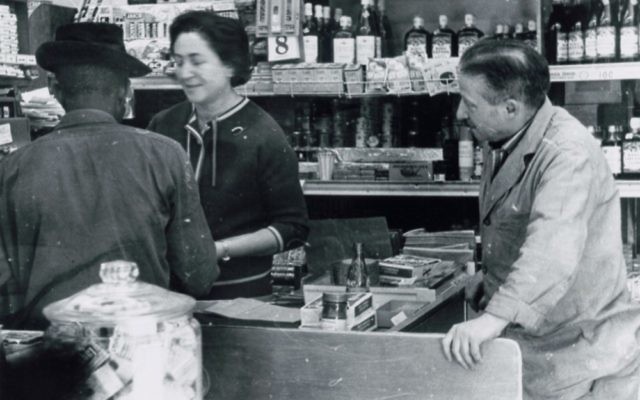Finding Family in the Breman Archives

Guest Column by Leigh Herman
My grandmother Helen Herman died when I was in middle school, and I lost my grandfather Emanuel Herman when I was 19. They were both survivors.
Thanks to the Breman Jewish Heritage Museum, I’ve had the opportunity to learn more about their stories, the details of which I worried had been lost forever.
Like so many third-generation descendants of Holocaust survivors, I grew up in the immense shadow of an atrocity both unknowable and intensely personal. I remember learning about World War II and reading “The Diary of Anne Frank” in elementary school, knowing that somewhere in the ether lay the stories of so many of my relatives.
I also remember seeing the tattoo on my grandfather’s forearm and being told that my sister and I couldn’t have bunk beds because they would trigger bad memories. Among my family, the topic of “the war” was not up for discussion.
But recently I found answers to so many of the questions I’ve pondered for so long.
The Emanuel Herman Family Papers are a collection of photographs of my family housed in the Cuba Family Archives for Southern Jewish History at the Breman. Seeing these images for the first time gave me a glimpse of what my grandparents’ lives were like in a way that the anecdotes I’ve collected over the years could not.
There’s an image of my father in the streets of Amsterdam as a toddler, images of my grandparents just after they were married, and an image of my grandfather’s brother, Oscar (my father’s namesake originally), who perished at Treblinka.
I find comfort in the smiles on my grandparents’ faces, knowing that after everything they went through, they found some happiness still.
They had both been married before the war, and both had children and spouses that they’d lost.
They met each other and got married in September 1946, and almost a year later my father was born in Bamberg, Germany. From there they moved to Amsterdam, then to the United States.

They came to Atlanta and opened a grocery store in the English Avenue neighborhood, an African-American community. They left persecution in Europe to arrive in a city struggling for racial equality.
I’ve heard stories about the grocery store my whole life. When they needed to expand the store, my grandparents just built a bigger one around the current one so that they could continue to work.
My grandmother was generous and kind to her customers; she forgave debts when some were unable to pay. Because of the Breman’s efforts, I now have concrete images to associate with those stories.
I stumbled upon these images from an embarrassingly simple starting point: a Google search. I’m a teacher at the Weber School, and last fall I researched the migration of Jewish refugees for a grant to travel to the Shanghai Jewish Refugees Museum. As I poured over pictures of refugees, I began to wonder if in some corner of the Internet I might find clues about my own family.
For some reason, it had never occurred to me to search my grandparents’ names. When I did, an entry in the archive at the Breman was the first link that showed up.
After contacting the archives’ curator, Jeremy Katz, I learned that my grandfather donated the five images to the museum in 1996 (the year my grandmother died). I do wonder why he never told us about the photos. Maybe he wanted to, and maybe he even tried. It was not easy to talk about.
This summer, miraculously, a new entry showed up when I again searched my grandfather’s name in the archives.
In 2000, a woman named Grace Hawthorne interviewed him about his experiences in the Holocaust, and the Breman obtained a transcript.
I never imagined something like it could exist. Around me, my grandfather never even said the word “Auschwitz,” let alone talk to me about his time there.
While I haven’t heard my grandfather’s voice in over 15 years, as I read this transcript, it felt as if we were finally able to have the conversation I’ve thought about my whole life.
I am eternally grateful for the efforts of those who are committed to making sure the world never forgets. The Breman has helped me understand my family’s story and preserved it for generations to come.
History Education
The photographs and interview transcript in the Breman archives opened Leigh Herman’s eyes to her grandfather’s thoughts about the camps and the conditions there, as well as showed her what her great-uncle Oscar looked like. She also learned that:
- Emanuel Herman grew up in Tomaszów, Poland.
- He had five siblings and worked as a tailor there.
- He survived five concentration camps, including several years at Auschwitz.
- The address of the Helen and Emanuel Herman’s store, H & E Grocery, was 533 Griffin St., a building that still exists more than 60 years later.




comments